Barawa
Barawa (Somali: Baraawe, Arabic: مدينة ﺑﺮﺍﻭة Madīna Barāwa), also known as Barawe and Brava, is the capital of the South West state of Somalia.[1] It functions as a port town in the southwestern Lower Shebelle region of Somalia. Facing the Somali Sea, Barawa serves as the main port of the South West State.
Barawa Baraawe مدينة ﺑَﺮَﺍﻭَة Madīna Barāwa | |
|---|---|
City | |
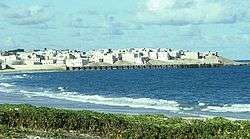 Barawa seafront | |
| Nickname(s): Brava Ierè | |
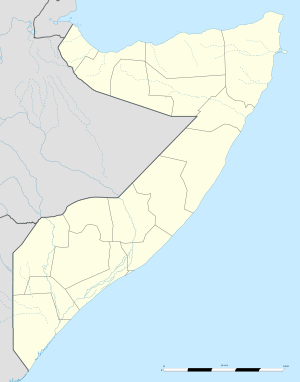 Barawa Location in Somalia. | |
| Coordinates: 1°06′48″N 44°01′49″E | |
| Country | |
| Region | Lower Shebelle |
| District | Barawa |
| Elevation | 0 m (0 ft) |
| Population | |
| • Total | 42,800 |
| Time zone | UTC+3 (EAT) |
| Area code(s) | +25261 |
History
At its height, Barawa was at its golden age from the Arab and Swahili influence and trading commerce with its neighboring states.[2] The city became a commercial power in the Indian Ocean - so much so that arab merchants from the city visited China as early as the 15th century. These envoys travelled in the ships of the renowned "trasure fleet" of admiral Zheng He, and they returned to Africa several years later during another of Zheng He's voyages. In 1430, Barawa was one of only 18 western ports mentioned by name in an imperial decree that was issued by the Xuande Emperor, it was named as Pu-la-wa, (不喇哇).[3]
Medieval
During the Middle Ages, Barawa and its surrounding area was part of the Ajuran Empire that governed much of southern Somalia and eastern Ethiopia. The domain extended from Hobyo in the north, to Qelafo in the west, to Kismayo in the south.[4]
From his experiences during the Ming treasure voyages in the early 15th century, the Chinese mariner Fei Xin characterized the people of Barawa as pure and honest.[5]
In 1506, the Battle of Barawa began after the Portuguese Empire decided to invade and capture the wealthy Somali harbour city. The commander of the Portuguese army was Tristão da Cunha: he set wanted to conquer the Ajuran territory, where the battle of Barawa was fought. After a long period of engagement, the Portuguese soldiers burned the city and looted it. However, fierce resistance by the local population and soldiers resulted in the Portuguese failing to permanently occupy the city. The Europeans were decisively defeated by the Somalis from Ajuran Empire. Refugees who had fled to the interior eventually returned and rebuilt Barawa. Tristão da Cunha was later severely wounded and sought refuge in the Socotra islands after losing his men and ships. After the battle, the city of Barawa quickly recovered from the attack.[6]
Early Modern Period
In the early modern period, Barawa was ruled by the Geledi Sultanate. Eventually, in 1910, Barawa was ceded to the control of Italy when the Geledi Sultanate was forced to agree to the annexation of all the Banadir ports to the Italian Company already established in the Horn of Africa after the 1910 death of the last Sultan Osman Ahmed. But the Italians faced stiff resistance from many parts of the Banadir coast. The inland regions and the trade of the Somali merchants would remain unchallenged in their independence for years to come.[7]
Sheikh Uways al-Barawi organised an Ikhwaan and led the Banadir revolt, but it was crushed by Portuguese forces in 1908.[8]
Contemporary
In addition to Sheikh Uways, Baraawe has produced numerous well-respected Ulama, including Sheikh Uways al-Barawi, Sheikh Nureini Sabiri, Sheikh Hajii Sadiq, Sheikh Qassim al-Baraawi, Sheikh Ma'llim Nuri, Sharif Qulatayn and a female poet-saint, Dada Masiti.[9] The city was the stronghold of the Hizbiya Digil-Mirifle (HDM) party, which was founded in 1947; it later became the Hizb al-Dastuur Mustaqil al-Somali (Somali Independent Constitutional Party, HDMS).[10]
Politics
In 2009, Al-Shabaab militants seized control of Barawa.[11] In September of that year, a United States military raid in the area killed Saleh Ali Saleh Nabhan, a suspected Al-Qaeda operative.[11]
In October 2013, United States Navy SEAL Team Six launched an unsuccessful raid against a beachside house in Barawa, targeting Mukhtar Abu Zubeyr, the leader of Al-Shabaab.[12] Following the raid, al-Shabab began a crackdown of the town.[13]
Following the launch of Operation Indian Ocean, the Somali Armed Forces assisted by AMISOM troops re-seized control of Barawa from Al-Shabaab in October 2014.[14] On October 11, during a trip to Barawa, President Hassan banned the charcoal trade in the city.[15]
Demographics
Barawa has a population of around 32,800 inhabitants.[16] The broader Barawa District has a total population of 96,0901 residents.[17]
As of recent, the town inhabitant became the Tunni clan, they lived in the outskirts of Barawa but gradually moved in to Barawa, becoming the majority inhabitants of the town.[18] In the main town of Barawa, the Bravanese people consist of various tribes who lived in Barawa for much longer centuries, such as the Hatimi clan, Bidda, Ooja, Gabra, Ashraaf, Shanshiya, Reer Faqi, Omar ba Omar and various others[19]. All these clans came into Barawa in different time periods, together they managed to come up with the language, Chimwiini, and establish a trading network with neighboring Swahili coastal towns[20]. In addition to the standard Bravanese Language (Chimini), which is a dialect of Swahili, the Tunni speak Tunni(a dialect of Somali) and the remaining people speak the standard Somali language.[21]
Gallery
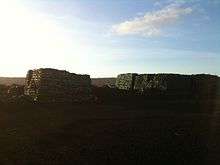 Charcoal in the port |
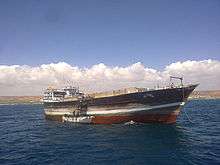 Exporting Charcoal by Indian boat |
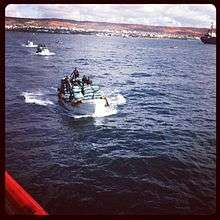 small volvos carriying Charcoal to the ship |
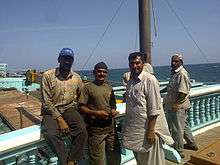 Pakistani in barava on their coal trade boat  volvo boat loading coal to the big boat, |
|---|---|---|---|
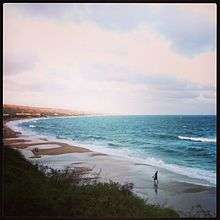 Barawa beach |
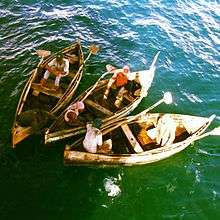 Small fish boats |
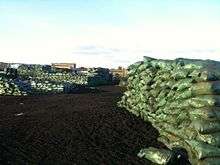 Charcoal in the port waiting export |
References
- Pelizzari, Elisa. "Guerre civile et question de genre en Somalie. Les événements et leurs retombées sur le destin d’une femme: Starlin Abdi Arush (1957-2002)." Cahiers du Genre 1 (2018): 193-213.
- Maganda, D., 2014. Swahili People And Their Language : A Teaching Handbook. Adonis & Abbey Publishers, p.23.
- Wyatt, The Blacks of Premodern China pp.97-8; Ma Huan, The Overall Survey of the Ocean's Shores pp.18-19
- Lee V. Cassanelli, The Shaping of Somali Society: Reconstructing the History of a Pastoral People, 1600-1900, (University of Pennsylvania Press: 1982), p.102.
- Dreyer, Edward L. (2007). Zheng He: China and the Oceans in the Early Ming Dynasty, 1405–1433. New York: Pearson Longman. p. 88. ISBN 9780321084439.
- The Book of Duarte Barbosa, Lisbon: Royal Academy of Sciences, 1812; translated and ed. Mansel Longworth Dames, p. 30; London: The Bedford Press, 1918
- The End of Slavery in Africa, ed. by Suzanne Miers, Richard L. Roberts, University of Wisconsin Press, 1988
- The Sheikh migrated to Biyoley to reorganize his Ikhwan, but was killed in 1909. One result of the unsuccessful revolt was the establishment of the Uwaysiyya order, named after the martyr Sheikh Uways. It established jama’as in the riverine region of southern Somalia and neighboring regions. These served as centres of charity and learning.
- Ahmed, Ali Jimale, ed. (1995). The Invention of Somalia (1st ed.). Lawrenceville, N.J.: Red Sea Press. p. 34. ISBN 978-0-932415-99-8.
- Port Cities of the Horn
- "Al-Shabab Vows to Avenge US Raid in Somalia". VOANews.com. Voice of America. 15 September 2009. Archived from the original on 17 September 2009. Retrieved 15 September 2009.
- Dozier, Kimberly; Guled, Abdi; Straziuso, Jason (6 October 2013). "US forces hit extremists behind E. Africa attacks". Yahoo News. Associated Press. Retrieved 23 April 2015.
- Gule, Abdi (10 October 2013). "Fear grips Somali town raided by SEAL commandos". Army Times. Associated Press. Retrieved 23 April 2015.
- "Mogadishu: Somali, African troops take key port from Shebab". Ma'an News Agency. 5 October 2014. Retrieved 5 October 2014.
- Somalia to halt banned charcoal trade at port recaptured from al Shabaab
- "Somalia City & Town Population". Tageo. Retrieved 4 October 2013.
- "Regions, districts, and their populations: Somalia 2005 (draft)" (PDF). UNDP. Retrieved 21 September 2013.
- Nurse, D. and Spear, T., 1985. The Swahili. Philadelphia: Univ. of Pennsylvania Pr., p.59.
- https://books.google.co.uk/books?id=epJyDwAAQBAJ&pg=PA7&dq=reer+hatimi+bida&hl=en&sa=X&ved=0ahUKEwifuNbRu_noAhUlUhUIHbyeDqcQ6AEIODAC#v=onepage&q=reer%20hatimi%20bida&f=false
- https://books.google.co.uk/books?id=ZItyAAAAMAAJ&dq=barawa+swahili+coast&focus=searchwithinvolume&q=barawa
- https://www.refworld.org/docid/3ae6ac7710.html
Bibliography
- Barbosa, Duarte (1866). A Description of the Coasts of East Africa and Malabar: In the Beginning of Sixteenth Century. Printed for the Hakluyt Society.